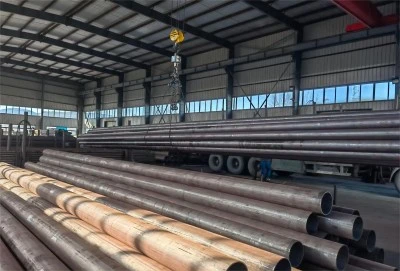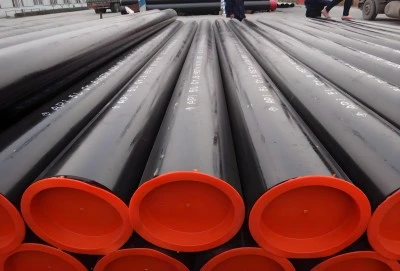The API 5L steel pipe is categorized into two main types: seamless steel pipes and welded steel pipes. Each sort has its fabricating forms, focal points, and ordinary applications inside the pipeline industry. Understanding the characteristics and contrasts between these pipe sorts is significant for engineers, venture supervisors, and obtainment masters included in pipeline plans and construction.
The choice between consistent and welded channels depends on different variables, including the aiming application, working conditions, venture determinations, and financial contemplations. Both sorts of channels have their put in the industry, with each advertising particular benefits for diverse pipeline scenarios.
|
|
|
Seamless Steel Pipe:
Consistent steel channels are a prevalent choice in the oil and gas industry, especially for applications requiring a smaller distance across channels, regularly less than 24 inches. These channels are fabricated without any welded creases, coming about in a uniform structure all through the pipe's cross-section. This characteristic makes consistent channels especially reasonable for high-pressure applications and situations where the astuteness of the pipe is basic.
The manufacturing process for seamless steel pipes involves either hot or cold rolling techniques. In the hot rolling process, a solid steel billet is heated to high temperatures and then pierced to create a hollow shell. This shell is then rolled and stretched to achieve the desired pipe dimensions. The cold rolling process, on the other hand, starts with a hot-rolled pipe that is further processed at room temperature to refine its dimensions and improve its mechanical properties.
Key advantages of seamless steel pipes include:
1. Uniform strength: The absence of welds ensures consistent strength throughout the pipe's length, reducing weak points that could be susceptible to failure under stress.
2. Higher pressure ratings: Seamless pipes generally have higher pressure ratings compared to welded pipes of the same size and grade, making them ideal for high-pressure applications.
3. Better fatigue resistance: The lack of welded seams contributes to improved fatigue resistance, which is crucial in applications involving cyclic loading or pressure fluctuations.
4. Improved corrosion resistance: The uniform structure of seamless pipes can offer better resistance to certain types of corrosion, particularly in aggressive environments.
5. Suitability for extreme temperatures: Seamless pipes perform well in both high and low-temperature applications, making them versatile for various operating conditions.
While seamless pipes offer numerous advantages, they also have some limitations. The manufacturing process for seamless pipes is generally more complex and energy-intensive compared to welded pipe production, which can result in higher costs. Additionally, the maximum diameter for seamless pipes is typically limited to around 24 inches, restricting their use in large-diameter pipeline projects.
Despite these limitations, seamless the API 5L steel pipe remains a crucial component in many oil and gas applications, particularly where high performance and reliability are paramount.
Welded Steel Pipes:
Welded steel pipes represent a significant portion of the API 5L steel pipe market, offering a cost-effective solution for a wide range of pipeline applications. These pipes are manufactured by forming steel plates or strips into a cylindrical shape and then welding the seam to create a continuous pipe. Welded pipes are particularly suitable for larger-diameter applications, with some manufacturing methods capable of producing pipes up to 100 inches in diameter.
There are several welding methods used in the production of the products, each with its characteristics and applications:
1. Electric Resistance Welding (ERW): This method is commonly used for smaller diameter pipes, typically up to 24 inches. In the ERW process, the edges of a steel strip are heated by electrical resistance and then pressed together to form a continuous weld. ERW pipes are known for their uniform wall thickness and good dimensional accuracy.
2. Longitudinal Submerged Arc Welding (LSAW): LSAW pipes are manufactured by welding a longitudinal seam along the length of a formed steel plate. This method is suitable for producing large-diameter pipes, typically ranging from 16 inches to 60 inches or more. LSAW pipes are known for their high strength and ability to withstand high pressures.
3. Spiral Submerged Arc Welding (SSAW): In this process, a steel strip is helically wound and welded to form a spiral seam. SSAW pipes can be produced in large diameters, often ranging from 24 inches to 100 inches. This method is particularly cost-effective for large-diameter pipes and offers good flexibility in terms of pipe length.
4. Double Submerged Arc Welding (DSAW): This method involves welding both the inside and outside of the pipe seam, resulting in a strong and reliable weld. DSAW is often used for thick-walled pipes and high-pressure applications.
Key advantages of welded steel pipes include:
1. Cost-effectiveness: Welded pipes are generally more economical to produce than seamless pipes, especially in larger diameters.
2. Availability in large diameters: Welded pipes can be manufactured in diameters significantly larger than seamless pipes, making them suitable for major transmission pipelines.
3. Consistent wall thickness: Modern welding techniques allow for precise control of wall thickness along the entire length of the pipe.
4. Flexibility in production: Welded pipes can be manufactured to custom lengths and specifications more easily than seamless pipes.
5. Good performance in many applications: With proper quality control and inspection, welded pipes can meet the performance requirements of most pipeline applications.
Wholesale High Quality API 5L Steel Pipe:
As an API 5L steel pipe manufacturer, LONGMA GROUP supplies high-quality pipes that meet the stringent requirements of the oil and gas industry.
LONGMA GROUP's status as the product manufacturer suggests that they have invested in the necessary equipment, expertise, and quality management systems to produce pipes that comply with the API 5L specification. Their ability to supply high-quality pipes is likely supported by rigorous testing and inspection protocols to ensure that each product meets the required specifications.
For those in the process of choosing API 5L steel pipe manufacturers, LONGMA GROUP invites potential customers to contact them at info@longma-group.com. This direct line of communication allows interested parties to inquire about specific product offerings, discuss technical requirements, and explore potential collaborations.














